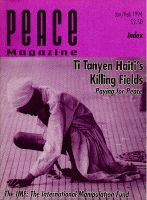
Peace Magazine Jan-Feb 1994, page 5. Some rights reserved.
Search for other articles by Metta Spencer here
There had to be some special reason for holding the third general assembly of HCA in Ankara, which surely was not chosen for its attractiveness. Inland Turkish cities resemble gray provincial Soviet towns except that, instead of statues of Stalin or Lenin, they have Ataturk. The most obvious other difference is that Turks every-where try to sell stuff, whereas Soviets used to be preoccupied with finding anything to buy. Every Ankara man over 25 has an Omar Sharif moustache, every woman or girl past menarche wears a drab scarf.
The special reason for choosing Ankara is that it is the capitol. Murat and Taciser Belge are famous throughout Turkey for their human rights activism, and they wanted HCA to shine a spotlight of international attention on the troubles between the government and the Kurds.
Besides, HCA has already acquired a good reputation for holding dialogues between conflicting national groups and helping both sides listen to the other. I sat in on one session for people from the Transcaucasus. The Georgians, Armenians, Azeris, Abkhazians, and Ossetians were hashing things out in Russian, under the patient chairmanship of a Dutch Calvinist, Mient-Jan Faber, for whom everything had to be translated. That seemed to slow them down and cool some of the agitation.
I didn't get to attend any of the Turkish-Kurdish dialogues, since I was busy running an election, but I heard that there was mostly anger and recrimination. No wonder: there are about 25 people killed every day in what the Turks do not consider a civil war. Most of the deaths take place in the southeast region of the country, where the Kurds are concentrated. However, there are Kurds in all the major cities, where they are better integrated than in the area that would like to become "Kurdestan." At a party the Canadian Ambassador saw my badge and introduced himself, immediately warning me against going to that region, where foreigners are sometimes taken hostage or worse.
Belge and some of the HCA officers went to see the Prime Minister, but no one expected her to relent in the military repression of the militant PKK, a group that has become to the Kurds what Sinn Fein is to the Northern Irish Catholics. Probably she could not keep her promise if she gave it, since the military does not answer to the Turkish government, but is a dominant force inside it. The military does not intend to back away from their repression of the Kurds. A physician who is active in the human rights organization told me it is impossible now for Turkey to democratize. (it takes courage even to be a human rights activist there; some have been killed, others tortured.)
Still, there has been some progress. Two years ago one would be jailed for speaking Kurdish, but not today.
As usual, the main topics in the workshops were nationalism and citizenship. The best speech was by Konstanty Gebert, a Polish journalist who rejects the notion of ethnic self-determination as a basis for the formation of states. Not surprisingly, Joanne Landy was the person who took the mike to reply. I had not expected Joanne to show up, she had been so critical of the HCA position on Yugoslavia. Her New York-based organization, the Campaign for Peace and Democracy, supports every separatist movement that comes along recklessly so, to my mind. They knew perfectly well there would be war if Slovenia and Croatia seceded, yet they supported secession as the only democratic way to go.
We Canadians were only three in the crowd of 1000. Marion Mathieson of Halifax attended and also David Matas, the Winnipeg lawyer and human rights activist. David proposed a great idea: that HCA Canada undertake to hold dialogues between Francophones and Anglophones. We will get together in a few weeks to begin planning such meetings. If you are interested, let me know.
After the Ankara assembly I headed for the Aegean coast to explore ancient ruins, then spent ten days in Istanbul; the people are friendly and expressive in those parts. In Istanbul, my hotel was owned by Kurds. The young cook, who speaks Kurdish, wants to go home to see his mother but it is too dangerous. In the army near Iraq he had been shot in the chest. I met several Kurds of varying political views and tried to set up a dialogue with them, which I would have published here, but the manager of the hotel told them not to talk to me. He feared stirring up trouble among the Kurds along the street, some of whom support the PKK.

Peace Magazine Jan-Feb 1994, page 5. Some rights reserved.
Search for other articles by Metta Spencer here